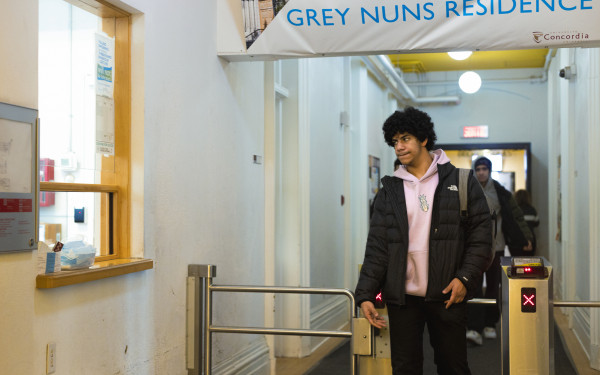Quebec Human Rights Commission Tells Concordia and Security Firm to Pay $33,000
Commission Finds Woman Was Racially and Socially Profiled, Concordia to Challenge Findings
Concordia University and the Montreal division of the Commissionnaires security firm are being asked to pay a former student $33,000 in damages for a racial and social profiling incident in 2013.
Commissionaires is a security firm that trains Quebec security guards.
The Quebec Human Rights Commission case is being led by the Centre for Research-Action on Race Relations, who’s representing Chantal Lapointe, a Haitian woman who says she was harassed by Concordia security guards while walking through the EV building one night in July 2013. She was not a student at the time.
“I want to give a wake up call to Concordia,” Lapointe said. “I can’t believe an academic institution like Concordia can have that mindset, I just can’t believe it. It’s unacceptable.”
“$33,000 is a very, very high and important amount of money,” CRARR executive director Fo Niemi said. “Hopefully it’ll serve as a deterrent so that institutions will not commit this kind of discrimination.”
At the time, Lapointe was making her way to the Webster Library, where she frequently does work, when she was stopped at the glass doors just before the Guy-Concordia metro by a Concordia security guard. The guard asked her where she was going and demanded that Lapointe take out ID.
“Maybe they chose me because they’re trying to humiliate me, that’s the way I feel about it,” she said.
Not understanding why she was being stopped or asked to identify herself, she asked why she was being stopped. The guard said that since she was on Concordia property, they had the right to ask for identification.
She wasn’t able to provide any since she wasn’t carrying ID at the time, but did show a bill she had as proof of address.
A security guard then started to take photos of her, which she says was a violation of her privacy. Soon two police officers were called over, and Lapointe was escorted out. They mentioned that if they saw her again in the metro, they would arrest her.
“I’m very used to the building,” Lapointe said. “When they’re sitting there, they don’t bother them, they don’t go to them and ask them to leave, so why did they focus on me?”
Lapointe believes she was harassed because of her race, and because the security guards and police believed she was homeless. Lapointe isn’t homeless and has never been. At the time, Lapointe was carrying a number of bags, and says she sometimes get misidentified as being homeless.
“This is one of the reasons why we believe the commissioner ruled she had also been a victim of social profiling,” Niemi said.
She also suspects her past as an activist could have made her a target. In the 90s, she worked as a community organizer with CRARR, and has worked with single mothers and minority women with the Women’s Y.
“Maybe they chose me because they’re trying to humiliate me, that’s the way I feel about it,” she said.
The human rights Commission, following a complaint by CRARR, confirms that. In a report compiled by the security guard, Lapointe was described as a “black female homeless” and as “Mrs. Voodo.” The security guard also said that Lapointe threatened to cast spells on them.
“Those are obviously the kind of stereotypes that we felt that led the Commission to conclude she was a victim of racial profiling,” said Niemi.
2_900_600_90.jpg)
Concordia University disagrees with the Commission’s findings and intends to challenge the decision at the Human Rights Tribunal, said their spokesperson, Mary-Jo Barr.
“Our security personnel are well versed on how to engage with students and the public in order to ensure the university is secure, respectful and welcoming at all times,” said Barr.
$20,000 is being jointly demanded from Concordia University and Commissionnaires for moral damages. Another $3,000 is being demanded from the Montreal division of the Commissionnaires for punitive damages, for unlawful and intentional interference with her rights, and another $10,000 being demanded for Concordia University in punitive damages.
The policies of Concordia’s security at the time stated that guards have the right to demand ID to anyone on the premises, the Commission found. CRARR is now demanding that Concordia revamp the policies of Concordia’s security in six months time and submit it to the Commission.
Since carding could be used to target homeless people who often don’t carry ID, CRARR wants to see that part of the policy removed, though Niemi admits he’s unsure of whether the carding policy is still in place.
“We believe this is a really important case, especially for the rights of the homeless as well,” said Niemi, since security guards trained by the the Montreal division of the Commissionnaires also work in malls and other public areas in the city.
They also want to see the addition of a new policy that will put in place mechanisms to prevent acts of discrimination by Concordia’s security agents, and for all Concordia security guards to receive anti-discrimination training. They want a report of the progress sent to the Commision one year later.
Concordia University and the Montreal division of the Commissionnaires have until Friday to pay up. If it isn’t paid by then, the case will go to tribunal.

1_900_600_90.jpg)
_600_832_s.png)

1_600_375_90_s_c1.jpg)


